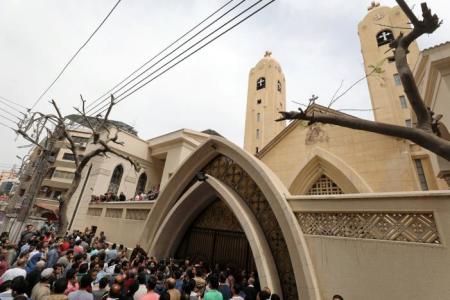Egyptian TV Host Suspended for Suggesting Terror Attacks On Churches Are 'OK'

An Egyptian television host has been suspended after she made an inappropriate comment about church bombings when speaking about last Friday's mosque attack in Sinai.
According to the Egypt Independent, television host Rasha Magdi was suspended from the privately-owned Sada al-Balad Media Group by the company's owner Mohamed Abu al-Enein for remarks that she made on air last Friday after terrorists attacked the al-Rawda mosque in Sinai.
After dozens of gunman attacked the mosque during Friday prayers and killed as many as 309 people and injured over 100 others, Magdi went off-script during her show and reportedly suggested that frequent terrorist attacks and the killing of Christians in Egypt is more understandable than terrorist attacks that target Muslims.
"We saw attacks by terrorists on the police and army, and we said this is mutual violence. These extremist groups have attacked churches and we said that they think it is a [different] religion, not Islam, and it is hostile to them, and then we said it is OK. But how [can these groups attack] Muslims?" Magdi was quoted as saying, according to a translation.
Considering that Christians in Egypt have suffered seemingly systemic persecution in Egypt this past year with church bombings and a series of murders, El-Enein decided to discipline the television personality for her comment.
"The entire Egyptian people stand united behind our valiant armed forces and the heroic police forces and, God willing, we will win in our battle against these cowards," El-Enein said in a statement, according to Egypt Indepependent. "All of us, leaders and people, reject terrorism in all of its forms on any part of Egypt or anywhere in the world."
Al-Enein went on to assert that Egyptians are "one people."
"[T]here is no difference between a Muslim and a Christian. All of us are equal," al-Enein stated. "We live together in safety. ... [T]errorism and aggression against the [people] are criminal acts."
The Egypt Independent notes that when Magdi worked for a state-run media network, there were a number of legal cases filed against her as she was accused of inciting hared toward Coptic Christians.
According to Open Doors USA's 2017 World Watch List, Egypt ranks as the 21st-worst country in the world when it comes to Christian persecution. Additionally, the Congressionally mandated United States Commission on International Religious Freedom has recommended that the U.S. State Department list Egypt as a "Tier 2" country, a designation that singles out countries where religious freedom violations are tolerated.
While the deadly bombing last Friday took the lives of over 300 Muslims, Christians in Egypt have faced their share of violence while trying to worship.
In December of 2016, 29 were killed and 47 were injured when a suicide bomber attacked the St. Peter and St. Paul's Church in Cairo.
On Palm Sunday, twin suicide bombings killed 47 people and injured 126 others at churches in Tanta and Alexandria. The Palm Sunday bombings caused a number of Egyptian churches to cut back on their Easter celebrations.
Earlier this month, a group of 12 evangelical leaders from the United States met with Egypt's President Abdel Fattah el-Sisi for nearly three hours at the presidential palace in Cairo. The meeting, organized by author Joel Rosenberg, was the first between Sisi and U.S. evangelicals.
Although Christians have faced horrific levels of persecution in Egypt, Rosenberg told CP earlier this month that things are improving on a national level.
"It's really terrorism persecuting Christians. In Egypt, there are certainly challenges with local security services and local leaders. But at the national level — post-Muslim Brotherhood being in charge — there is still a lot of difficulties of changing the system," Rosenberg said. "President el-Sisi is trying to change the system. He passed the first churches law to build churches and renovate churches, the first real reforms in 150 years."
"As we asked about these issues, he said, 'Christians are being attacked and we are working to fight the very radical Islamist terrorists that are endangering Muslims as well as Christians. But we are also doing very specific things to help Christians to make them equal Egyptians. They are not second-class citizens. We don't want to think of them as Christians or Muslims. We want to think of them as Egyptians,'" Rosenberg recalled. "That was a big deal for him. What made it a big deal for us is that he has got three years of a track record. He is not telling us that he will do this one day, he is saying, 'This is what we have done and we got more to do.'"
According to USCIRF, religious freedom conditions in Egypt have "improved in several areas over the past year."
"In August, the newly-seated parliament passed a long-awaited law on the construction and maintenance of churches and, by early 2017, the government completed rebuilding and restoring more than 50 churches destroyed by extremists in 2013," a USCIRF fact sheet states. "In 2016, prosecutions, convictions, and imprisonment of Egyptian citizens for blasphemy and related charges decreased. Some discriminatory and repressive laws and policies that restrict freedom of religion or belief remain in place, but public debates occurred in parliament and civil society on a range of religious freedom concerns."





















